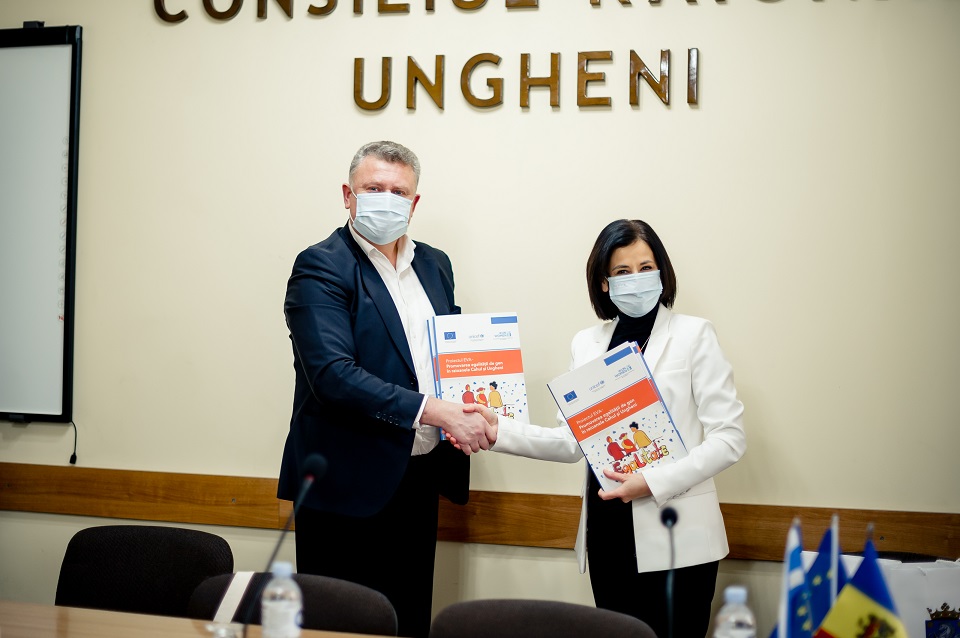UN Women Moldova and Ungheni District Council signed a memorandum of understanding to develop a specialised service for victims of sexual violence
Date:

UN Women Moldova and Ungheni District Council signed today a Memorandum of Understanding to develop a specialised service for victims of violence in Ungheni district. It will be the first service of such kind in the Republic of Moldova, and will be created with the support of the European Union under the EVA Project – ‘Strengthened Gender Action in Cahul and Ungheni districts’, implemented by UN Women in partnership with UNICEF.
This Memorandum envisages the establishment and piloting of a specialised service for victims of sexual violence in accordance with the law of the Republic of Moldova and the Istanbul Convention, as well as in compliance with the best practices from the European Union.
Victoria Neaga, Project Manager at the European Union Delegation in the Republic of Moldova highlighted the support provided by the European Union for projects promoting gender equality: ‘The signing of this memorandum indicates that this specialised service for victims of sexual violence will be well implemented and sustainable. The European Union will continue to support such projects considering that it is the first time we have an Action Plan on Gender Equality until 2025, which will include ambitious actions promoting gender equality and women’s empowerment. In this context, we would like the service in Ungheni to be successful and then replicated at the national level.’
Ghenadi Mitriuc, host of the event and president of Ungheni district, showed his support for the establishment of this service: ‘It is a unique and important service for both Ungheni and the Republic of Moldova. I hope it will be an example for other communities. Through this memorandum, we commit to provide full support to victims of sexual violence in the region.’
At the national level, as well as at the local level, we notice that from the moment the criminal offence is committed until the conviction of the perpetrator, victims of sexual violence encounter a series of procedural violations of their rights, biased approaches, stereotypes, actions that intimidate them, put them in a disadvantaged situation, discriminate them due to the criminal offence, although they are victims and bear no guilt for the committed crimes. At the same time, the national law has no quality standards regarding the provision of services and care to victims of sexual violence, which ultimately results in a fragmented and ineffective response to such cases.
In this regard, the specialised service will provide the opportunity for victims of sexual violence to benefit from integrated services ‘under one roof’ focused on the needs of victims/survivors of violence. This will ensure the right to privacy, the right to psychological and specialised healthcare. The established centre will be a safe place where forensic evidence can be collected during a single visit; this will strengthen cross-sectoral cooperation between professionals from all areas (sector police officers, representatives of local public authorities, social workers, healthcare representatives, psychologists, etc.) to respond promptly and professionally in cases of sexual violence.
‘It is essential to develop such service at both local and national levels. Statistics show that at national level, in 2020, the Trust Line for Women received 105 calls that related to 48 cases of sexual violence, and all sexual violence victims were women and girls. There might be many cases that are not reported due to traumas and stigma, and this centre will provide a reliable and safe environment for people who are in need of legal, psychological and social counselling, etc. I would like to thank the local authorities and the European Union for openness and support, and we, as a United Nations Agency will be with you for the next 3 years.’ said Dominika Stojanoska, UN Women Representative to Moldova.
At the same time, Tatiana Lazăr, deputy-president of Ungheni district, mentioned that: ‘It is a challenging, important and very needed project. Through this service, we will achieve a very strategic objective for our district, which is to provide support for victims of sexual violence at all levels. I am sure that once such centre is created, victims will gain confidence, will report the cases and receive psycho-emotional care, etc.’
The service will be staffed with doctors, nurses and psychologists. Services will be confidentially provided to sexual violence victims meeting international standards.
The EVA Project – ‘Strengthened Gender Action in Cahul and Ungheni districts’ is funded by the European Union and implemented by UN Women in partnership with UNICEF Moldova.
Contact data:
Valentina Bordian, Communication Officer at EVA Project
Tel. +373 604 25050, email: valentina.bordian@unwomen.org